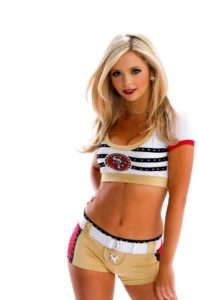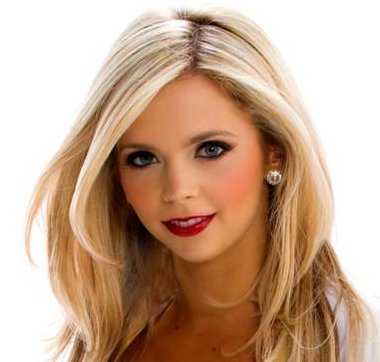 Pleased to introduce you to our newest Science Cheerleader, Rachel, who holds a Chemical Engineering degree from Massachusetts Institute of Technology (MIT), and works on batteries for Tesla Motors’ electric cars. [Note: Rachel retired from the 49ers in 2012. She’s also now attending Harvard Business School with an eye toward getting back into technology through an internship in the energy industry.]
Pleased to introduce you to our newest Science Cheerleader, Rachel, who holds a Chemical Engineering degree from Massachusetts Institute of Technology (MIT), and works on batteries for Tesla Motors’ electric cars. [Note: Rachel retired from the 49ers in 2012. She’s also now attending Harvard Business School with an eye toward getting back into technology through an internship in the energy industry.]
Rachel, what turned you on to engineering and when?
Rachel: I realized I was interested in science a bit later than most engineers. I went to a public magnet high school with great science teachers. I fell in love with chemistry in 10th grade and could not get enough of it. Chemistry explains the world around us—how great is that?! My chemistry teacher, Mr. Zawodny, was a great inspiration and suggested I look into engineering as a potential college major. (Before that, I was also considering being a teacher. I think good teachers are critical, but was convinced I could impact more people by developing a technology or solving an engineering problem.) I also loved math and was fond of biology and physics.
Favorite courses you took to prepare for your Chemical Engineering degree at MIT?
Rachel: My favorites were Fluid Dynamics and Advanced Energy Conversion. I liked Fluids because it presented a new way of thinking about flow and it was challenging in a satisfying way. In Energy Conversion, I was able to use my thermodynamics and other engineering skills to solve problems about topics I was really interested in. I knew that I had to be able to understand the details behind energy conversion in order to help the world transition to renewables.
Tell us about the teams you’ve cheered for, how long you’ve cheered for them, and why you tried out to be a professional cheerleader.
Rachel: I cheered for the Phoenix Suns for a year while working at a battery startup in Phoenix and now the San Francisco 49ers while working at an electric vehicle company. I have always loved to dance but never once thought I would do it professionally. I did not take lessons at studios growing up, but I was part of a kids hip hop performance team. Dance was always something I did for fun after school. As a senior at MIT, I realized I wanted to have a unique experience while I was still young—via professional cheerleading. From my childhood dance performances to MIT Dance Troupe shows, I knew my love for performing was undeniable. It is an adrenaline rush to dance in front of so many people! A football stadium is the ultimate venue!
Which came first? Your interest in engineering or cheerleading?
Rachel: I was always curious about how things worked but did not realize this was the early sign of my interest in science. My interest in dance was first. My mom said that before I could really walk, I would put my hands on my hips and “dance” (sway back and forth) whenever music played.
What’s a typical work day like for you?
Rachel: My primary goal at work is to guide the development of lithium ion batteries for new electric vehicles. They have certain requirements that are different from your everyday batteries. I am in charge of all the initial characterization tests for incoming battery cells. Day to day, I create test schedules and run them on rechargeable batteries with different chemistries and energy levels. I then analyze the electrical output to determine if the battery could be a good candidate for a future vehicle. It is really exciting because I get to see the latest, most advanced cells in the battery industry. I work full-time, five days a week. My weekends are usually all 49ers Gold Rush related—with an all-day practice on Saturday, and often a game or appearance on Sunday. During the week, I make time to go to the gym, practice my routines, and otherwise prepare for game day.
Best part of your day job?
Rachel: The perk of getting to borrow a company electric sports car for the day! Actually, the best part is knowing that by helping electric vehicles reach the mass market, I am moving all of us toward a cleaner, better future.
Do you find that stereotypes about cheerleaders helped or hindered your studies or professional experiences?
Rachel: People may write you off at first, but once they hear you speak intelligently on a topic, watch you use your brain, or see what you are capable of, their opinion quickly changes. It is empowering, fun, and satisfying to defy people’s expectations of you.
How do your fellow cheerleaders accept your interest in engineering?
Rachel: I have the most amazing teammates on Gold Rush and they are definitely proud of me. Many have told me that they love being able to tell others that there are engineers on their team. We all push each other to be the best we can be in whatever field that may be.
Do you have any advice for youngsters who might feel torn between following one dream and another?
Rachel: Do both! You really don’t have to choose. Nerdiness is “in” anyway. Always do things for yourself, first of all. And it is perfectly realistic to be a balanced, social being while also excelling at science. Start preparing for both careers as soon as possible. Dance-wise, I wish I had taken ballet or jazz classes growing up—so start training. In regards to engineering and science, it is extremely important to take the most challenging math and science classes you can find. You cannot just want to be a scientist or engineer—you really need to challenge yourself so you can develop the problem-solving skills. Talk to your teachers about your interest and they will most likely help guide you. And don’t forget to work really hard at whatever you decide to do!
Along these lines, what advice would you give your 12-year-old self?
Rachel: I don’t have many regrets. But yes, I would have enrolled in dance classes. (It’s more difficult to learn turns as an adult. I took beginning ballet classes with 10 year-olds!)
What are your plans for the future?
Rachel: I plan to continue using my engineering skills to contribute to society’s transition to renewable energy sources. (And I am hoping to dance at the 2013 Super Bowl!)
Best cheerleading experience?
Rachel: Where do I start? Cheering at the NFC Championship Game was amazing. The fans and energy in the stadium were incredible. Although we just barely lost in overtime, I was honored to be a part of such a historical game. I was also very fortunate to represent the NFL in China. Dancing on the sidelines of a Chinese football game is one of those incredible life experiences that seems surreal. However, I think my favorite single experience was the 49ers vs. Saints playoff game, where we scored a winning touchdown with only 9 seconds remaining! I’ll always remember what that moment felt like!
Best engineering-related experience?
Rachel: This is also a tough one to narrow down, but maybe it was the time I presented my research from a publication I worked on to a large audience at a science and engineering symposium. It’s exciting to know that other people are interested in your research; also, it is a cool feeling to realize you may know more about that one topic, however narrow it may be, than anyone else! (One day I want to be an expert on a renewable energy topic.)
If you could rewind the clock and change your degree, would you?
Rachel: No. The chemical engineering curriculum helped me develop my problem solving skills and allowed me to take very interesting classes. I believe I am smarter for the hard work and thought I put into earning my degree. As batteries and renewable energy become hotter topics, MIT has added more relevant classes that I wish were offered when I attended. For choosing a college degree, I can recommend an approach that worked well for me. Go through the majors that seem to interest you and 1) Look at the actual courses you would be required to take in college, 2) Read/subscribe to an industry publication or similar to see if the research from that field interests you, 3) Talk to a current college student with that major, preferably at the school you are thinking of attending. More upfront work will increase the chances you will be satisfied in the end.
Why do you want to be a Science Cheerleader?
Rachel: I would love to be a role model for young women considering or pursuing a career in science and engineering. I hope I can inspire someone to follow her dreams. Being an NFL cheerleader is a great way to be a role model because it puts you in the public eye where your story, passions and advice can be shared.


I met her! She was nice… prob doesn’t remember me though.
Being the chemistry science teacher Rachel mentions in her article, I am very happy Rachel chose to be an engineer. She was an excellent student and I can say she was one of the best. Go get em!!!!!
Reading this makes me proud to be an MIT alum. Wish we had more ladies like her back when I was an undergrad at the ‘Tute. It would’ve saved me from making all those trips to Wellesley.